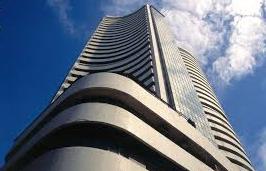 Mumbai, Aug 18: A lowered growth forecast, the widening monsoon deficit and diminishing hopes of a rate cut, coupled with a stalled reforms process, dented investor confidence in the Indian equity markets on Tuesday.
Mumbai, Aug 18: A lowered growth forecast, the widening monsoon deficit and diminishing hopes of a rate cut, coupled with a stalled reforms process, dented investor confidence in the Indian equity markets on Tuesday.
Bearish sentiments led the barometer 30-scrip sensitive index (Sensex) of the S&P Bombay Stock Exchange (BSE) to provisionally close lower by 47 points.
The subdued moves also impacted the wider 50-scrip Nifty of the National Stock Exchange (NSE). It fell by 11 points or 0.13 percent at 8,466.55 points.
The S&P BSE Sensex, which opened at 27,949.13 points, provisionally closed at 28,831.54 points (at 3.35 p.m.) — down 46.73 points or 0.17 percent from the previous day’s close at 27,878.27 points.
The BSE Sensex touched a high of 28,040.73 points and a low of 27,747.40 points in the intra-day trade.
Analysts cited the continuous slide in the Chinese stock markets, the worries over the imploding economy there and its effect on the yuan devaluation as major concern for investors.
“The Chinese markets were down 5-5.5 percent today. This is a major concern for the world economy as the Chinese government, brokerage firms and mutual funds aren’t able to arrest the fall in their markets. Though unrelated, the stock market crash can transform into further yuan devaluation to perk up the economy,” Devendra Nevgi, chief executive of ZyFin Advisors, told.
“With yuan devaluation, the scenario will be set for currency wars at a time of lower world growth, commodity price crash and the likelihood of US Fed raising interest rates in a decade.”
The yuan devaluation will impact the Indian rupee which crashed to its new two-year low on Monday. The slide in rupee value negates the advantage of lower commodity prices — like that of crude oil.
The Indian rupee touched a new two-year low at Rs.65.33 to a US dollar on Monday.
Other worries for investors stem from the fact that the Reserve Bank of India (RBI) has shown its reluctance to cut interest rates even after current data showed inflation being under control.
“The reluctance of RBI to cut rates even after excellent Consumer Price Index (CPI) and Wholesale Price Index (WPI) numbers and at the time of yuan devaluation has disappointed investors,” Vinod Nair, head of fundamental research, Geojit BNP Paribas Financial Services told IANS.
According to Nair, the stalling of the reforms process — especially the deadlock over the GST (goods and services tax) bill — has demoralised investors and cast a shadow over the government’s push for better economy policies and ease of doing business.
Another dampener in the day’s trade was global credit ratings agency Moody’s decision to lower India’s growth forecast for this year by 50 basis points to seven percent.
“We have revised our GDP growth (for India) forecast down to around seven percent in light of a drier than average monsoon although rainfall was not as low as feared at the start of the season,” it said in its latest “Global Macro Outlook 2015-16” released on Tuesday.
The ratings agency’s latest assessment comes against the backdrop of official statements by the Indian government that the monsoon rains were now predicted at 10 percent below normal even as the country’s grain output fell 4.7 percent in the 2014-15 (July to June) season.
Sector-wise, healthy buying was observed in information technology (IT), capital goods, consumer durables, automobile and technology, entertainment and media (TECK) stocks.
However, metals, healthcare and banks sectors came under intense selling pressure.
The S&P BSE IT index augmented by 186.89 points, capital goods index gained by 157.05 points, consumer durables index rose by 131.25 points, automobile index edged higher by 116.58 points and TECK index was up by 60.92 points.
On the other hand, the S&P BSE metal index plunged by 151.90 points, healthcare index receded by 102.37 points and banks index lost 42.14 points. (IANS)
